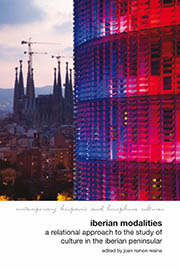Book contents
- Frontmatter
- Contents
- Preface
- List of Contributors
- Introduction: Iberian Modalities: The Logic of an Intercultural Field
- Part I Institutionalizing Iberian Studies: A Change of Paradigm
- Part II Theorizing Iberia
- Part III Iberian Dialogs
- Part IV From Sea to Iberian Sea
- 12 Immortality, Corruption, and the Sisè Seny: João de Barros's Empire of Language
- 13 The Iberian Problem: A Confederative Model for Pessoa's Heteronyms
- 14 Lisbon as Destination: Josep Pla's Iberianism through His Travels to Portugal
- Works Cited
- Index
13 - The Iberian Problem: A Confederative Model for Pessoa's Heteronyms
from Part IV - From Sea to Iberian Sea
- Frontmatter
- Contents
- Preface
- List of Contributors
- Introduction: Iberian Modalities: The Logic of an Intercultural Field
- Part I Institutionalizing Iberian Studies: A Change of Paradigm
- Part II Theorizing Iberia
- Part III Iberian Dialogs
- Part IV From Sea to Iberian Sea
- 12 Immortality, Corruption, and the Sisè Seny: João de Barros's Empire of Language
- 13 The Iberian Problem: A Confederative Model for Pessoa's Heteronyms
- 14 Lisbon as Destination: Josep Pla's Iberianism through His Travels to Portugal
- Works Cited
- Index
Summary
Fernando Pessoa is known to have been many authors. Each had a name, but these were not pseudonyms. Rather, they are heteronyms, as he explains in an oft-quoted autobiographical blurb requested by presença magazine. Only so neurotic a namer as Pessoa could have possibly come up with the difference between these concepts, which is basically a distinction about how names are used. Whereas pseudonyms are optional labels for one and the same person, as it were, a heteronym is the given name of a person who simply never had a body. A heteronym is the proper kind of namesake, that is to say, for one who, despite his or her bodily non-existence, is yet a “complete individuality” (“Tábua Bibliográfica” 404). In a word, a soul, as Pessoa occasionally puts it (The Book of Disquiet).
There were at least three such souls, with the heteronyms “Ricardo Reis,” “Álvaro de Campos,” and “Alberto Caeiro,” and the debate goes on over which, if any, of his other 70 some noms de plume would deserve such a label. Must not a soul have a body, one might ask? To believe Pessoa, perhaps it need not have a body to be real. Whether those “individualities are more or less real than Fernando Pessoa himself – that is a metaphysical question” that he “will never possibly solve”:
The works of these three poets constitute […] a dramatic set; and the interaction between their personalities, as well as their own personal relationships, were duly studied. […]
- Type
- Chapter
- Information
- Iberian ModalitiesA Relational Approach to the Study of Culture in the Iberian Peninsula, pp. 212 - 224Publisher: Liverpool University PressPrint publication year: 2013

